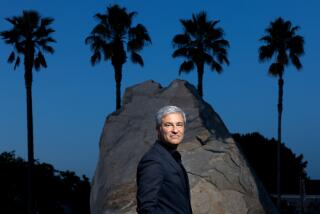MOCA meeting aims to generate unity among trustees
- Share via
After a summer of discontent, the board of L.A.’s Museum of Contemporary Art has scheduled a special meeting Tuesday, aiming to unite trustees whose willingness to donate is vital to reversing recent budget cuts.
“I think it is going to be very candid and open,” said Susan Gersh, one of the few trustees willing to speak publicly about MOCA’s problems. “We’ve got to be unified in some way. Otherwise, it’ll be a free-for-all.”
Discord at MOCA has generated headlines since late June, when the longtime chief curator Paul Schimmel was forced to resign because he and museum director Jeffrey Deitch couldn’t get along.
All four artists on the board — Ed Ruscha, John Baldessari, Barbara Kruger and Catherine Opie — soon resigned, bringing to eight the number of trustees who have quit since February or not renewed expiring three-year terms.
The board’s argument over MOCA’s direction under Deitch spilled into the letters and opinion pages of the Los Angeles Times. Leading donor Eli Broad and Wallis Annenberg, whose Annenberg Foundation has given the museum about $3.5 million over the last five years, lined up behind the museum director.
But four of Broad’s fellow “life trustees” — an honor conferring permanent nonvoting board membership, with no obligation to pay the $75,000 minimum dues expected of regular trustees — argued that Deitch’s “celebrity-driven program … is not the answer.”
Other grievances had been simmering on the board even before Schimmel’s exit.
Some say that Broad has too much influence after his $30-million rescue of the museum in December 2008, when years of overspending and fundraising shortfalls had left it financially depleted.
There’s also a perception that the 10 or so trustees who make up the MOCA board’s executive committee have too much power and share too little information.
Broad played an important role in Deitch’s 2010 hiring, an unorthodox and controversial pick because he was a prominent art dealer rather than coming from the usual pool of museum curators and arts administrators.
For this story, The Times approached all 39 MOCA trustees by email or phone. Only six agreed to be interviewed: Gersh, former Hard Rock Cafe operator Peter Morton and the four life trustees whose letter to The Times disputed an opinion piece by Broad that said MOCA was on the right course.
Lenore Greenberg, a life trustee and former board president with more than 30 years’ service to MOCA, said board members were improperly cut out of the decision-making process while the museum contracted with Google to create a new YouTube channel called MOCA TV.
The deal was announced at the trustees’ January meeting, Greenberg said, having already been decided by the board’s executive committee, without a vote by the full membership.
Greenberg says the board’s rules give the executive committee authority to act on its own only to accept artworks offered as gifts at year’s end, when it would be hard to get a quorum, and the donors are rushing to qualify for tax deductions.
“It’s very discouraging,” she said. “The way board meetings have been run has not been one in which open discussion is encouraged.” The museum announced in January that MOCA TV would debut in July, but it hasn’t yet been launched.
Jane Nathanson, an organizer of many fundraising events since the 1980s, said a lack of discussion on the board figured in her March resignation.
“It’s difficult to maintain engagement on the part of the entire board when the decision-making is limited to a few,” she said. “Eli stepped in, and it sort of became a one-man show.”
Distress over how the MOCA board operates surfaced in an exchange of emails in early August between trustee Lauren King and board president Jeffrey Soros, which was obtained by The Times.
King, who was co-chair of the committee that deals with fundraising, objected to a decision to take her and several others off the executive committee.
Soros — a documentary film producer and nephew of famed billionaire George Soros — replied that “the feeling was that the executive committee was overpopulated, inhibiting its true function, that is to move quickly in exigent circumstances.”
King responded unhappily: “It’s very strange to be voted off an executive committee and not even know about it. No self-appointed small elite group should be able to …reappoint themselves, change board rules to eliminate other executive board members, eliminate an education committee, fire a curator.... It’s a wonder that any board member stays under the current regime.... We keep getting letters telling us that everything is fine. Just to let you know — it’s not.”
Soros did not respond to an email requesting comment; King said the email should have been kept internal, and declined to comment.
Meanwhile, the $130-million Broad Collection museum that’s expected to open in 2014 across Grand Avenue from MOCA’s headquarters is also causing worry among board members.
Greenberg said she’s concerned that MOCA’s independence could be compromised because the spouses of MOCA board co-chairs David Johnson and Maria Arena Bell serve on nonprofit boards that answer to Broad and affect MOCA. Suzanne Nora Johnson is on the board of governors of the Broad Foundation, the grant-making body that’s a party to the $30-million bailout, and William Bell is on the Broad Collection board of governors.
“You need to have an acceptable separation,” Greenberg said.
“I think the whole board is traumatized by Eli Broad,” said MOCA life trustee Audrey Irmas, whose $3.5-million donation to a late-1990s endowment campaign and exhibition is the sixth-largest publicly disclosed cash gift in museum history.
Frederick Nicholas, who joined Greenberg, Irmas and Betye Burton in the letter to The Times answering Broad’s Op-Ed article, said that unless the Broad Collection’s relationship with MOCA is clarified, committed museum supporters might reconsider what’s in their wills.
“There’s a whole atmosphere of fear with some of the donors and that has to be taken care of,” he said.
The solution, Nicholas said, would be for MOCA board leaders and Broad to provide all the information needed to address “what’s troubling people like me. If we’re comfortable, I think support for MOCA will come back.”
Donations to MOCA fell $4 million in the first year under Deitch; MOCA would not provide information on its financial performance since mid-2011, so subsequent results are unclear.
In his Op-Ed piece, Broad wrote that the museum’s budget is now $14.3 million. That’s the lowest since the 1990s, dropping MOCA behind UCLA’s Hammer Museum, whose budget has risen to $17.2 million.
In early August, nine executive committee members tried to reassure the board, in an email obtained by The Times, that MOCA remains on track as “a defining and progressive leader in contemporary art.”
Morton said he’s not troubled about recent budget cuts — “Any institution sometimes has to bring costs in line” — but that he has “issues with the board” that he will address in private.
Gersh, whose late mother-in-law, Beatrice Gersh, was a founder of MOCA, said her priorities include undoing cuts to education programs, hiring “a chief curator of the first rank,” and funding a balanced exhibition schedule in which Deitch’s signature populism and appeal to young audiences can coexist with the art scholarship that was a hallmark under Schimmel.
The coming board meeting “will tell us a lot about the direction in which we will be traveling,” Gersh said. “If we have the funding, anything is possible. It’s important to find out from those who can [donate], how they feel.”
She hopes the art-loving public will be patient. “Wealthy people want to make sure they’re making a good, healthy investment. I think you need to give us some time and some space to heal internally.”
More to Read
The biggest entertainment stories
Get our big stories about Hollywood, film, television, music, arts, culture and more right in your inbox as soon as they publish.
You may occasionally receive promotional content from the Los Angeles Times.











